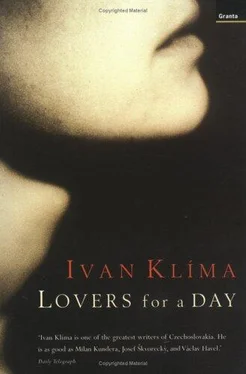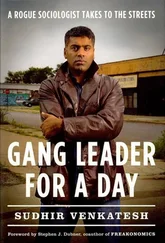So the two of them started to go out together.
He wouldn't have been able to explain to anyone why he was going out with a blind girl, but then there is no explaining
love, it simply happens. At first he was attracted by the fact that she moved in a different world, one without light or colour, a world full of hostile shapes and obstacles. In the days following their first encounter he tried to imagine that world. He stopped watching television and started to listen to the radio, partly so that he would be able to talk to her about various programmes. On his way home — he lived in a quiet residential area — he would try walking along the familiar footpath with his eyes closed. Sometimes he would even pick up a fallen branch and try to use it like a white stick. Even so he never managed to walk more than forty paces. Then he would stop and not dare take another step in the dark. A world without colour was like a black-and-white film, but even a black-and-white film made use of shapes. What shapes were there in her world? What were her dreams like? He would have liked to ask, but they got used to not talking about her blindness and she did her level best not to seem different in any way from other people. In fact, once when he took her with him to the riding school she asked if she could try riding a horse. He went along with her game that she differed in no way from him and explained to her what she must do in the saddle. Then he helped her mount one of the mildest tempered fillies and led her in a circle around the arena, while Běta, thanks to her natural sense of rhythm, jogged up and down in the saddle as if she was an avid watcher of Westerns.
'What colour is this filly?' she wanted to know.
'Brown.'
'I thought so.'
'Why?'
'Because she's warm.'
In an effort to become more familiar with his world, the
world of the sighted, she would ask about colours which she could only imagine as various degrees of warmth or cold. What was cold she perceived as white, what was hot as red, orange or yellow.
How would she perceive the yellowing leaves of the birch trees in autumn?
Most likely as the quietest of rustling in the breeze.
She also liked using words that belonged to the vocabulary of the sighted. 'I saw you in the distance,' she would say when they had a rendezvous somewhere. How could she see him in the distance? Only insofar as she could make out the sound of his footsteps.
She stopped in front of a flower-stall. 'Look at those beautiful fresh roses!'
How could she tell they were beautiful and fresh? By their scent maybe.
He was also moved by her gratitude for his love. 'Is it possible that you really love me?'
He assured her that it was.
'But why? You could have found so many sighted girls.'
He told her it didn't matter whether she could see or not.
'Why? With me you can do hardly any of the things you could with them.'
He told her that he particularly liked the fact that her world was different from his. On the contrary, uniformity was like death. In death everything and everyone became the same, didn't they?
'You'll leave me one day, anyway. But I don't want to think about it. You're with me now and I'm grateful to you for every second.'
'Don't thank me. I could just as easily thank you.'
'For what? For what?'
'For your love.'
'You can't thank me for that.'
'There you are, then.'
'I'm grateful to you anyway. Maybe I'll repay you one day. Either I will, or God will.'
'There's nothing to repay.' Then he said. 'Love can only be repaid with love.'
'I know. That's what I mean.'
Sometimes it struck him that her world, which lacked colours and clearly defined shapes, was no poorer than his own. It might be less colourful, but it was deeper and more intense. The same was true of her feelings and her capacity to experience things. He wasn't sure 'whether he would be capable of such depth, of concentrating on a piece of music, a thought, an experience or a feeling, the way she did. When he first met her he was ready to pity her. He liked the fact that he had to lean down to her, that he was giving her what nobody else would give her, but he could equally envy her and accept that she was giving him something that he would never find with a woman who was as frivolous as he was.
They listened to music together, walked together in the streets and parks, sipped wine in cheap little cafés (he was only a student, after all) and made love in his room, in the woods, or on a sun-warmed rock that she boldly clambered up with him.
Sometimes when they were parting, she would say softly, like a word of farewell, 'Don't leave me yet!' And he wasn't sure whether she meant that very moment or the next day; whether it was a quiet entreaty for him to come again. Usually he would kiss her then and tell her he wouldn't leave her.
He hadn't left her — so far, but as the summer went by
there was a waning of his enthusiasm for the impenetrable world of the blind. He was, after all, too attached to the hustle and bustle of the world of the sighted and more and more often he would be aware of what he was missing with a blind girl. He was also sure that he didn't want to live with her for the rest of his life, that it would be too much for him. He knew that one day, sooner rather than later, he would leave her. This realization did not unduly bother him: after all one lived for the present, not the future. People who 'worried too much about the future were incapable of experiencing the here and now. When the time came, most likely at the end of the holidays, they would simply stop seeing one another. It might be harder for Běta than for him, but it couldn't be helped.
Before the holidays were over he planned to go off to the Tatras with his mountaineering friends. He could simply tell Běta that he was going off for ten days, but subconsciously he felt that this would be a more final separation. After the holidays, his life would return to normal and she wouldn't fit into it somehow. He felt that he ought to think up a last treat for her, something special that they could both remember. He had had a warning dream in which he fell into a deep rocky chasm from which there was no escape. Even though he wasn't superstitious and the dream could easily be interpreted as suppressed anxiety, it was a good pretext for him to change his travel plans. He set off with Běta for the Silica plateau area of Southern Slovakia. They found a room in a little inn near the station. The countryside was almost flat but dotted here and there with limestone outcrops or seemingly bottomless ravines.
The morning after their arrival was sultry, a sign of an impending storm, but in spite of this they decided to go into
the forest to escape the heat. The forest lay close to the village and extended way beyond the Hungarian border.
They climbed a stony footpath that was already scorching hot from the morning sun and entered the woods. As long as they kept to the path he didn't even need to lead her by the hand. She only needed to hear the sound of his footsteps ahead of her.
The path was narrow and in places it disappeared in the grass. They reached a cross-roads: one path sloped gently uphill and he chose that one. She followed him obediently like a blind puppy. What would become of her if he lost her? She'd die, most likely. What would happen if he were to injure himself in some way and they couldn't go on? They'd both die, probably. Strange hollows started to appear at each side of the path, as if someone had forced the land into a powerful press and it was beginning to burst.
He took Běta by the hand for safety. The forest became darker and there was the sound of distant thunder. At the next cross-roads he started to become anxious. They ought to make their way back but he was no longer sure of the right direction. He took one of the paths and guided her along it until eventually the track ended in a kind of wooded gorge.
Читать дальше












